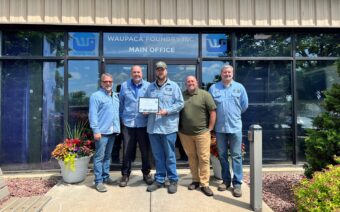
December 12, 2023
ALGOMA – ESI (Empowering and Supporting Individuals) in Algoma was started in 1973 by a group of parents wanting a local resource that offered their children care and meaningful activities.
CEO Tracy Nelson said ESI is still operating under that same premise today.
“It’s an amazing story if you think about what it took from a group of 10 parents having the courage, energy and time to develop a place,” she said. “It started as a small place in a garage downtown. We’re a large nonprofit known around the state for some of the production methods and accommodations we’ve created to help people with disabilities work in the community. We’ve touched a lot of lives.”
Nelson said ESI – which is located at 813 Rabas St. and was formerly known as East Shore Industries – serves clients in Kewaunee, Door and Brown counties and helps individuals with disabilities and autism live their best lives, achieving greater independence, both in everyday living and work readiness.
“Kewaunee County doesn’t have a lot of people,” she said. “It’s often said there are more cows than people, but this is a remarkable facility for our community. You can go to many counties across the state that are far larger than Kewaunee County that don’t have resources like this. It’s a testament to the people in this county and what they believe in and care about. It grew out of a lot of hard work.”
Nelson has been with the company since 2006, serving as the chief financial officer before taking over for Ron Opicka (the only other CEO ESI has ever had) in 2015.
“Ron was the original CEO and was hired by the original group of parents,” Nelson said. “Ron was responsible for leading the charge in what those parents wanted and putting together the resources and people for what was needed.”
In 1977, after a donation from Fred and Thea Jay Peterson, continued financial donations from area families and a Small Business Administration loan, a new facility was built on Rabas Street, where ESI remains today.
“A big part of why ESI has been so successful occurred when Algoma Mop Manufacturers was purchased (in 1981),” Nelson said. “Ron saw the need to control the workflow for people with disabilities. They wanted to have their own company so they could take the profits and put those back into developing the company.”

Tracy Nelson
At the time, Nelson said, Algoma Mop Manufacturers made a lower-quality mop.
“Today, Algoma Mop Manufacturers has become known as a USA-made, high-quality mop,” she said. “It’s still in operation – we provide wet/dust mops to all the Universities of Wisconsin and correctional facilities. We have a fair market analysis done to make sure we’re competitive and have to meet or beat whatever the market price would be for that item. It’s provided many hours of skilled work for people with disabilities. We sell about $500,000 worth of mops annually.”
Nelson said 100% of the labor on the work floor is done by ESI members.
How ESI works
Serving about 100 members per year with its 25 employees, Nelson said ESI has a variety of services to “meet every person where they’re at” in their independence journey.
“Gaining independence looks different for every person,” she said. “One service we offer is facility-based. Maybe that’s somebody who can’t be out in the community as much, so they come spend their day in our facility. Maybe that means eating on their own and making good choices about food, how to better fit in socially with their peers, etc.”
Nelson said those individuals still go out into the community, but they do so in groups.
“It’s more of a social aspect,” she said.
ESI, Nelson said, also has individuals come directly to the facility and work.
“They are here as a launching pad to community employment,” she said. “Maybe they aren’t quite ready yet – they have to work on the soft skills to work in a community environment and learn more job skills. They eventually transition to community employment.”

ESI serves clients in Kewaunee, Door and Brown counties. Submitted Photo
Nelson said ESI also helps fit clients with community-based employment.
“We have someone who works for us that helps individuals find jobs in the community,” she said. “Those individuals might not spend any time in our agency. They might just need a little help – how to build a resume, how to become better at interviewing or maybe go out and tour other companies and find jobs.”
Nelson said another program ESI offers has changed and evolved over the years.
“The focus of (this) ESI (program) is taking people who have been acclimated to living closer to home – or on their own – and having them better integrated into community living,” she said. “We have programs where people come here for the day, but then they are out in the community. They go out in small groups, with no more than four individuals.”
The goal of that program, Nelson said, is to help teach individuals how to make connections through community resources.
“It’s so they can live independently in the community,” she said. “When they go to the gas station, the library, etc. the people behind the counter learn to know them as individuals – it provides a safe way for people with disabilities to go about this – it helps them have their own voice. We teach them they need to decide and figure things out.”
Nelson said ESI doesn’t just work with individuals who were born with disabilities.
“It could also help someone who has brain trauma or had an accident in life,” she said. “On average, we have 45-50 people here daily who are receiving some type of service.”
Labor shortages equal more workers needed
Nelson said when she started at ESI 17 years ago, the agency looked completely different compared to what it is now.
“We did a lot of facility-based work back then, but in today’s times, with the labor shortage, that works out to our benefit,” she said. “The idea of hiring people with disabilities has become much more attractive.”

ESI, located at 813 Rabas St. in Algoma, is celebrating 50 years of helping individuals with disabilities live their best lives. Submitted Photo
With so many businesses posting “Help Wanted” signs, Nelson said employers are “more willing to make accommodations to help employ our workforce.”
“Nowadays, we spend much more time on community employment compared to facility-based work,” she said. “It’s turned out to be a gift. It’s sometimes difficult to integrate our population into the community because sometimes we don’t see as much patience and kindness in what we need.”
Nelson said adults with disabilities are the same as anyone else.
“They have the same needs and wants and want dignity and respect – work is important to them,” she said. “Work helps them gain respect and self-esteem. We need to help educate our communities so people understand people with disabilities are adults and need to be treated like adults. We focus on that a lot when we talk to groups.”
To learn more about ESI, visit esiempowers.com.
 Trust Point: Meeting fiscal, volunteer needs across communities
Trust Point: Meeting fiscal, volunteer needs across communities Bluff View Bank: A bank with a 142-year view
Bluff View Bank: A bank with a 142-year view








